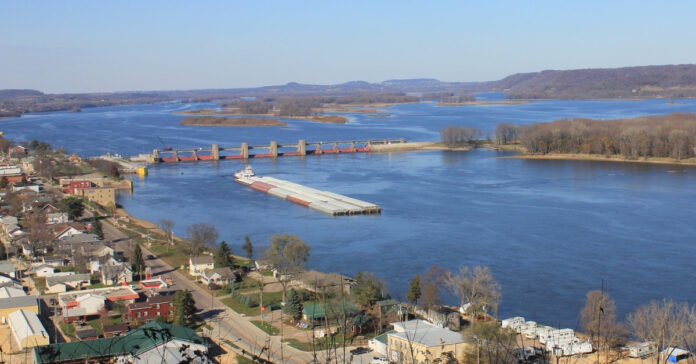Just when the supply chain was looking better than it had been for a few years, we get a shotgun blast of multiple threats: A pronounced lack of diesel fuel, low water levels on the Mississippi river, the possibility of a rail strike, and Russia bowing out of the grain export agreement that allowed Ukraine to export grain.
Globally, the threat to grain is probably the biggest. The recent shipments from Ukraine had helped moderate grain prices and were a boon to third world countries. Now those grains cannot leave by ship, which will curtain exports and result in rising prices.
The situation in the Mississippi river makes things worse. Barges that haul grain from Midwestern farms cannot transit the Mississippi. That means corn, wheat and soybeans are stuck on barges, sitting in grain silos, or in carp-covered piles on the ground instead of being loaded into the bellies of ships and carried to waiting customers around the world.
While this may not cause food shortages here in the U.S., it will contribute to rising prices and food inflation. As diesel fuel shortages drive up the cost of transportation, this will impact all goods, including food.
Diesel Problems
The reason the U.S. has less than four weeks of diesel fuel on hand is not so much a shortage of oil, as it is a shortage of refining capacity and a lack of distribution. The government’s anti-fossil fuel stance and various efforts to eliminate the use of gas and diesel fuel in the next decade or two means no oil company wants to invest the billions of dollars and years of permitting to construct new refineries. Companies that are happy to make capital invests when they can project a good return on their investment are loath to do so in uncertain markets or when those profits are threatened by legislation.
The Biden administration has made its contempt of the oil and gas industry clear, and yet as prices rise and shortages persist, they wonder why the Democrats are so unpopular heading into the midterm elections. Unfortunately, these problems will persist well beyond the Biden administration and after Democratic control of congress ceases to exist. Drilling and developing new oil wells, fracking, constructing pipelines, and investing in other energy infrastructure take years, years that are being squandered. These oil shortages are going to be with us for some time, and the leftists celebrate that while the rest of us pay through our nose for home heating oil, electricity and fuel for our cars.
Let’s be clear about one thing: When you read that the U.S. has only 24 days (or whatever) of fuel left, that means if production ceased. Because refineries are working 24×7, we won’t run out of fuel in 24 days. When this number drops, as it has been, it means that the country is using more diesel or gasoline than it is producing, which is an unsustainable situation. Unless production increases or oil tankers laden with gas or diesel show up at East Coast ports, tight supplies will create vulnerabilities and occasional outages.
Rail Strike in Three Weeks
While a rail strike was initially averted, two of the unions that had to accept the compromise deal have voted against it. Two more unions, among the largest representing rail workers, have yet to vote. If they reach no new agreement, rail workers could go on strike as early as November 19, with a good bit of freight likely being sidelined a few days beforehand. Because freight trains carry a far greater variety of goods than barges, a rail strike is likely to affect American consumers far more than the river being closed to barge traffic.
Freight trains crisscross the nation, delivering coal to power plants, chlorine to water purification plants, polymers and chemicals to manufacturers, fertilizer to farmers, metals and ores to mines and processors, grain to bakers and processors, and containers of imported goods from ports to warehouses. Without trains, freight will pile up in ports, but undelivered goods will also pile up at manufacturers because there are not enough long-haul truckers to deliver everything. Even UPS has used trains to move packages cross country.
Average Americans will feel the impact of a rail strike before the lack of grains. On its heels, we’ll feel the lack of diesel fuel. These problems will make a winter with high heating costs seem even more miserable.
If you’re prepared for the end of the world, surviving a fuel shortage, a rail strike or even rising grain prices should be doable. Just don’t expect it to be any fun.







